Closed Loop Partners Invests $2 Million in Reterra to Further Close the Loop on PET Plastic & Keep Valuable Materials in Play
March 03, 2020
Using advanced recycling technologies, Reterra turns discards from the plastic recycling process into high-value intermediary products.
NEW YORK, March 3 — Today, Closed Loop Partners announces a $2 million investment in Reterra, a Houston-based advanced recycling company founded in 1999. Reterra’s technology turns waste byproduct streams of PET plastic that are produced during the recycling process into high value intermediary products. In doing so, Reterra creates a market for material that would otherwise typically end up in a landfill, while also improving the overall economics of PET recycling.
With 3-6% of material lost throughout the recycling process of PET, and the demand for recycled plastic set to grow, there is a significant and growing opportunity for recapturing the discarded material from PET recyclers. Thirty seven of the world’s largest brands and retailers have made public commitments to incorporate a specified amount of recycled content in their packaging within the next ten years. This demand creates the pull through the recycling system and sends signals to packaging suppliers and manufacturers to shift their supply chains in order to include more recycled content.
“Reterra’s advanced process serves a critical role in lowering the cost of PET recycling by capturing even the smallest discards of material and making a high value product from them. This solves a system-wide issue that will become increasingly important as the market for recycled plastics continues to grow,”
Ron Gonen, CEO of Closed Loop Partners.
Reterra’s innovative technology transforms the discards into a liquid intermediary that becomes useful feedstock for a number of different applications, thus turning waste into value. The investment from Closed Loop Partners will help finance the move into their recently-acquired new facility and upgrade equipment to increase capacity and meet new customer demands. The new plant will double capacity immediately, enabling them to increase processing to almost 100 million pounds of material annually within two years.
“For the last five years we’ve been operating at capacity, but with the help of Closed Loop Partners we are now able to take our business to the next level and capitalize on the growing market demand for our products,”
Jason Ball, President of Reterra.
The investment comes via Closed Loop Partners’ Infrastructure Fund, its first project finance fund. The fund is backed by the world’s largest brands and retailers and aims to build recycling and circular economy infrastructure across the United States to better recapture materials and get them back into manufacturing supply chains.
About Closed Loop Partners
Closed Loop Partners is a New York based investment firm comprised of venture capital, growth equity, private equity, project finance and an innovation center. The firm invests in the circular economy, a new economic model focused on a profitable and sustainable future. Investors include many of the world’s largest consumer goods companies and family offices interested in investments that provide strong financial returns and tangible social impact.
Media contact: [email protected]
NextGen Consortium Begins Piloting Sustainable Cup Solutions in San Francisco Bay Area
February 18, 2020
Local cafes join the Consortium’s efforts to advance reusable, recyclable and/or compostable cup solutions in select pilots
SAN FRANCISCO, Feb. 18, 2020 /PRNewswire/ — Today, the NextGen Consortium — a multi-year consortium that addresses single-use food packaging waste globally by advancing the design, commercialization and recovery of food packaging alternatives — announced the launch of reusable cup pilots in local cafes in the City of San Francisco and City of Palo Alto, CA.
Two of the 12 NextGen Cup Challenge winners – CupClub and Muuse – will pilot their respective “smart” reusable cup systems in open environments across clusters of local cafes on a rolling basis over the coming weeks. Live piloting offers these cup companies the opportunity to further test, learn and innovate according to the unique material, technical and operational changes necessary to facilitate a seamless and convenient transition to reusable cups for customers and companies. The size and complexity of the pilots, along with the customer feedback and data captured during them, will provide valuable insights into each cup’s technical feasibility, business viability, user desirability and circular resiliency. Alongside participating local cafes, the City of Palo Alto will be hosting cup drop off points in a number of civic buildings downtown and the City of San Francisco has helped to facilitate connections with local businesses.
Scaling the next generation cup won’t happen overnight; the cup system is complex and calls for multiple layers of testing. From the ability for baristas and customers to handle cups with ease, to alignment with diverse waste recovery systems after-use, testing is key. Reusable cup systems will need to be cost-competitive, integrate smoothly across diverse operations and technology platforms, minimize operational disruption, and have a positive impact on the environment and meet the convenience and performance standards customers know and trust in order to scale.
These pilots build on the NextGen Consortium’s work to advance the development of new, alternative cup solutions through the necessary iterative loops of innovation and testing before scaling. Additionally, in March, two NextGen Cup Challenge winners — Footprint LLC and PTT MCC Biochem Company Limited — will also begin pilots in cafes in Oakland, testing their single-use cup solutions that pioneer alternative materials for cups and cup liners that are recyclable and/or compostable. These ensure that the valuable materials in cups are kept in circulation and out of landfills and the natural environment.
The NextGen Consortium is managed by Closed Loop Partners’ Center for the Circular Economy. Starbucks and McDonald’s are founding partners, with The Coca-Cola Company, Yum! Brands, Nestlé and Wendy’s as supporting partners, The World Wildlife Fund as the advisory partner and global design firm IDEO as the innovation partner. IDEO is designing and running the pilots in the San Francisco Bay Area on behalf of the NextGen Consortium.
“We know finding a more sustainable cup solution will continue to require partnership and innovative thinking,” says Michael Kobori, Chief Sustainability Officer at Starbucks. “The ongoing work from the NextGen Cup Consortium provides valuable insights and learnings for all the members, us included, as we continue to explore a variety of ways to better manage our waste and reduce our environmental footprint.”
“We’re excited to see many of the winning ideas become potential solutions that can be tested in a customer-facing environment,” says Marion Gross, Senior Vice President and Chief Supply Chain Officer, McDonald’s North America. “Finding a cup that can be scaled will require continued innovation, testing and honing of solutions, so these pilots are an important step forward on that journey.”
Together, the NextGen Consortium’s unprecedented collective of brands are helping to shape the ultimate form these cup innovations will take in the world. “As we strive to build a more circular economy in which we design out waste, unique partnerships are essential,” says Kate Daly, Managing Director at Closed Loop Partners. “Our work to engage diverse stakeholders, from brands to universities to NGOs, ensures that we create the necessary robust testing framework to help these cup teams succeed.”
These pilots represent one important initiative within the broader work of the NextGen Consortium to create long-lasting, positive change across the cup system. The NextGen Consortium takes a systems view, pairing upstream product innovation with downstream recovery infrastructure. The Consortium brings together leading food and beverage companies to work together pre-competitively to identify and scale solutions that work for the whole industry.
Participating Local Cafes
Reusable Cup Pilots: Palo Alto, CA
CupClub:
- Coupa Cafe:
- Ramona
- 538 Ramona St, Palo Alto, CA
- Lytton
- 111 Lytton Ave, Palo Alto, CA
- GSB
- 655 Knight Way, Stanford, CA
- Green Library
- 571 Escondido Mall, Stanford, CA 94301
- Ramona
- Verve Coffee Roasters
- 162 University Ave, Palo Alto, CA 94301
DROP POINTS
- Cafe Venetia (drop point only):
- 419 University Ave, Palo Alto, CA 94301
- City of Palo Alto (drop point only):
- City of Palo Alto City Hall
- 250 Hamilton Ave, Palo Alto, CA 94301
- City of Palo Alto City Hall
- Coupa Cafe Y2E2 (drop point only):
- 473 Via Ortega, Stanford, CA
Reusable Cup Pilots: San Francisco, CA
Muuse:
- Andytown Coffee Roasters
- 181 Fremont St, San Francisco
- Ritual Coffee Roasters
- 432b Octavia St, San Francisco
- Equator Coffees
- 222 2nd St, San Francisco, CA 94105
- La Boulangerie de San Francisco, Hayes
- 500 Hayes St, San Francisco, CA 94102
Single-Use Cup Pilots: Oakland, CA
Footprint LLC:
- Red Bay Coffee
- 3098 East 10th Street Oakland, CA 94601
- 2327 Broadway Oakland, CA 94612
- 1503 Macdonald Ave Richmond, CA 94801
- Equator Coffees
- 175 Bay Pl, Oakland, CA 94610
PTT MCC Biochem Company Limited:
- Snow White Coffee
- 3824 Piedmont Ave, Oakland, CA 94611
About NextGen Consortium
The NextGen Consortium is a multi-year, global consortium that addresses single-use food packaging waste globally by advancing the design, commercialization, and recovery of food packaging alternatives. The NextGen Consortium is managed by Closed Loop Partners’ Center for the Circular Economy. Starbucks and McDonald’s are the founding partners of the Consortium, The Coca-Cola Company, Yum! Brands, Nestlé, and Wendy’s are supporting partners. The World Wildlife Fund (WWF) is the advisory partner and IDEO is the innovation partner. Learn more at www.nextgenconsortium.com.
About Closed Loop Partners
Closed Loop Partners is a New York based investment firm comprised of venture capital, growth equity, private equity, project finance and an innovation center. The firm invests in the circular economy, a new economic model focused on a profitable and sustainable future. Investors include many of the world’s largest consumer goods companies and family offices interested in investments that provide strong financial returns and tangible social impact. In 2018, Closed Loop Partners launched the Center for the Circular Economy, a New York City-based collaboration center for innovators to commercialize products, services and technologies that are leading the transition from a linear take, make, waste economy to a restorative one in which materials are shared, re-used, and continuously cycled. Learn more at www.closedlooppartners.com.
Contact: [email protected]
SOURCE Closed Loop Partners
America’s Leading Beverage Companies Unite To Reduce New Plastic Use & Increase Collection Of Their Valuable Bottles Through ‘Every Bottle Back’ Initiative
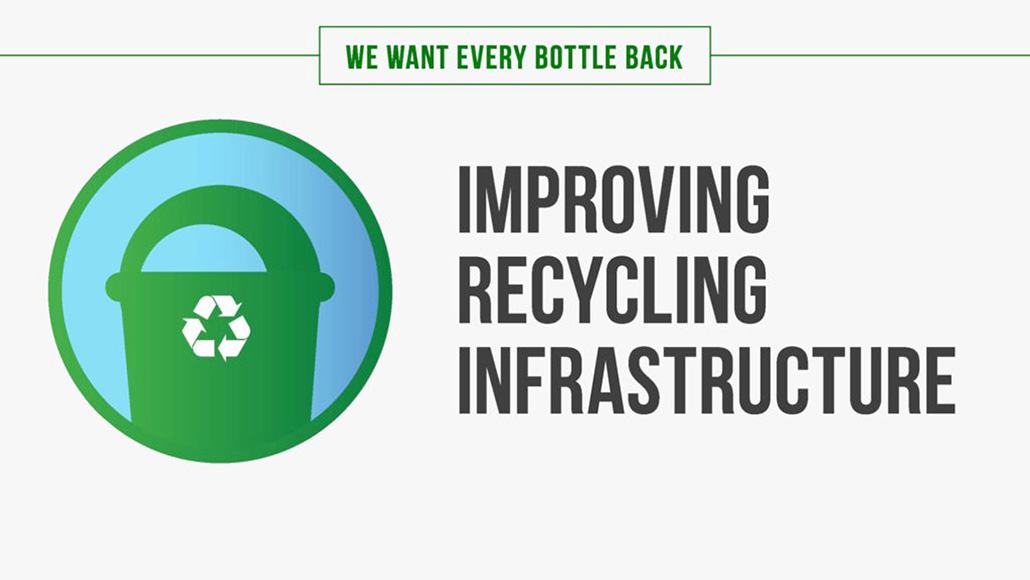
The Coca-Cola Company, PepsiCo and Keurig Dr Pepper Will Support Circular Plastics Economy Through Investment and Action, in Conjunction with World Wildlife Fund, The Recycling Partnership & Closed Loop Partners
WASHINGTON – America’s leading beverage companies – The Coca-Cola Company, PepsiCo and Keurig Dr Pepper – today announced the launch of the Every Bottle Back initiative, a breakthrough effort to reduce the industry’s use of new plastic by making significant investments to improve the collection of the industry’s valuable plastic bottles so they can be made into new bottles. These competitors are coming together to support the circular plastics economy by reinforcing to consumers the value of their 100% recyclable plastic bottles and caps and ensuring they don’t end up as waste in oceans, rivers or landfills. This program is being executed in conjunction with two of the country’s most prominent environmental nonprofits and the leading investment firm focused on the development of the circular economy. The World Wildlife Fund (WWF) will provide strategic scientific advice to help measure the industry’s progress in reducing its plastic footprint and The Recycling Partnership and Closed Loop Partners will assist in deploying funds for the initiative.
“Our industry recognizes the serious need to reduce new plastic in our environment, and we want to do our part to lead with innovative solutions. Our bottles are designed to be remade, and that is why this program is so important. We are excited to partner with the leading environmental and recycling organizations to build a circular system for the production, use, recovery and remaking of our bottles. Every Bottle Back will ensure that our plastic bottles are recovered after use and remade into new bottles, so we can reduce the amount of new plastic used to bring our beverages to market. This is an important step for our industry, and it builds on our ongoing commitment to protecting the environment for generations to come.”
Katherine Lugar, president and CEO of the American Beverage Association (ABA)
The Every Bottle Back initiative, spearheaded by ABA, will:
- Measure industry progress in reducing the use of new plastic in the United States through a collaboration with ReSource: Plastic, WWF’s corporate activation hub to help companies turn their ambitious plastic waste commitments into meaningful and measurable progress by rethinking the way plastic material is produced, used and recycled. Specifically, ABA will use the ReSource: Plastic accounting methodology to track on the collective progress made on executing strategies to reduce the use of new plastic as well as a resource in identifying additional interventions.
- Improve the quality and availability of recycled plastic in key regions of the country by directing the equivalent of $400 million to The Recycling Partnership and Closed Loop Partners through a new $100 million industry fund that will be matched three-to-one by other grants and investors. The investments will be used to improve sorting, processing and collection in areas with the biggest infrastructure gaps to help increase the amount of recycled plastic available to be remade into beverage bottles.
- Launch a public awareness campaign to help consumers understand the value of 100% recyclable bottles through community outreach and partner engagement and reinforce the importance of getting these bottles back, so they can be remade into new bottles. According to a poll conducted by Public Opinion Strategies (POS) on behalf of ABA, nearly half of consumers were unaware that America’s leading beverage companies are already making bottles that are 100% recyclable, including the caps.
- Work together to leverage our packaging to remind consumers that our bottles are 100% recyclable and can be remade into new bottles. Beverage companies will begin introducing voluntary messaging on packages beginning in late 2020.
“Reaching our goal of No Plastic in Nature by 2030 will only happen if business, governments and the NGO community work together to fix a broken plastic material system. ABA is driving this sense of collaboration within the beverage industry to address one critical piece within this system, which is PET recycling in the U.S. Measured by our ReSource: Plastic footprint tracker, the efforts made through Every Bottle Back will be met with data-driven solutions to ensure that real progress is being made. We hope the ambition raised by this initiative will inspire other industries to follow suit within the broader effort to stop plastic waste pollution.”
Sheila Bonini, senior vice president of private sector engagement at WWF
“The beverage industry cannot deliver on its promises of sustainable packaging without serious improvements to the current U.S. recycling system. Working in partnership with the beverage industry on its Every Bottle Back initiative will help to improve local recycling and provide Americans with stronger recycling programs for all materials, including plastic bottles. We applaud ABA’s members for launching meaningful, measurable work.”
Keefe Harrison, chief executive officer of The Recycling Partnership
“The leadership exhibited by The Coca-Cola Company, PepsiCo and Keurig Dr Pepper provides the investment necessary to optimize recycling in these cities and states. This partnership will serve as a model for the effectiveness of industry collaboration in modernizing recycling infrastructure and driving a reduction in the use of virgin plastic.”
Ron Gonen, chief executive officer of Closed Loop Partners
The majority of plastic beverage containers in the United States are made from polyethylene terephthalate, or PET, a strong, lightweight and safe plastic approved by the U.S. Food and Drug Administration (FDA) for use in food and beverage containers. It is unique, and because of its quality and versatility, recycled PET for years has been in high demand for use in an array of products as varied as clothing, carpets and playground equipment. Through the Every Bottle Back initiative, beverage companies are stepping up efforts to reclaim as much plastic packaging as possible to ensure it is remade into new PET bottles.
These efforts support other sustainability efforts underway by The Coca-Cola Company, PepsiCo and Keurig Dr Pepper.
“We’re proud to come together with our competitors to address the serious issue of plastic waste in our environment. We know we cannot do this alone and, in order to meet our goals and those of our industry, we need to work in partnership to drive collective action to ensure our bottles have second, third and fourth lives through continued recycling and re-use.”
James Dinkins, president, Coca-Cola North America
“At PepsiCo, we are striving to build a world where plastics need never become waste. We are proud to collaborate with others in the industry and respected partners to advance that vision and to do the hard work needed to educate consumers, enable collections and inspire action to recycle our plastic bottles. More recycled plastic lessens the need for new plastic.”
Kirk Tanner, chief executive officer, PepsiCo Beverages North America
“We have seen the meaningful impact this industry can have when we collaborate, and we are proud to be partnering to reduce our collective use of new plastic, while increasing the recycling and reuse of our 100% recyclable bottles. The Every Bottle Back initiative supports KDP’s top environmental priority to reduce packaging waste, as we work to support a circular economy with strong collective action.”
Derek Hopkins, chief commercial officer, Keurig Dr Pepper
Learn more about the Every Bottle Back initiative at www.EveryBottleBack.org. To schedule an interview, please contact the ABA press office at [email protected].
Closed Loop Partners Invests in Algramo to Advance Affordable, Reusable Packaging Systems
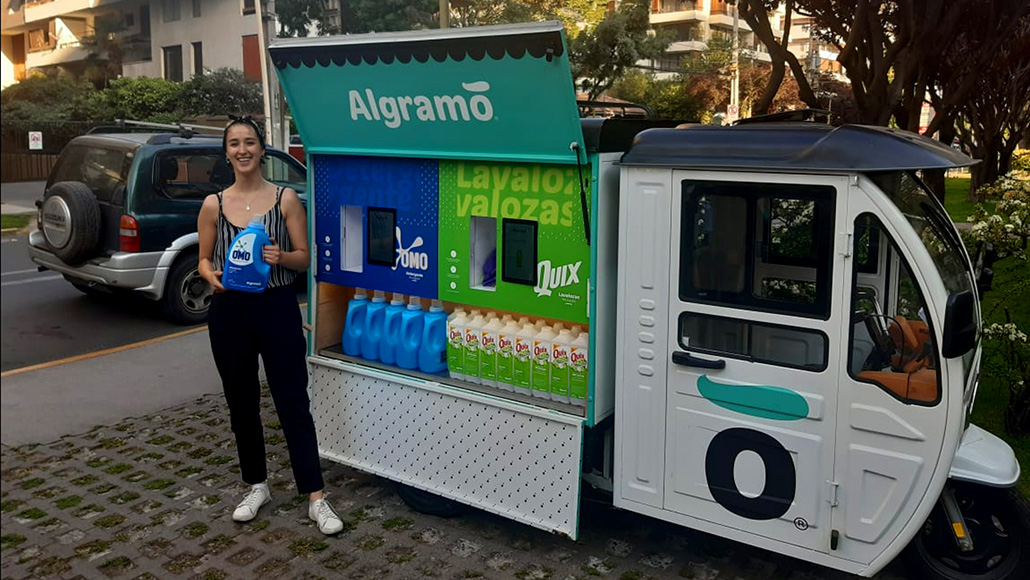
Already in partnership with brands like Unilever, Algramo’s smart packaging reimagines the future of grocery shopping while eliminating single-use plastic packaging waste.
Contact: [email protected]
October 14 – Closed Loop Partners, a New York based investment firm focused on building the circular economy, announced today its investment in Algramo through its venture capital fund, Closed Loop Ventures (CLV).
Founded in 2012, Algramo is a Chilean based startup solving economic and environmental issues through its vending machines that dispense staple products, like household cleaners and grains “by the gram” to customers.
Jose “Cote” Manuel Moller, Founder and CEO of Algramo, saw first-hand in Santiago, Chile, how those living in low income neighborhoods were penalized by an effective 40% “poverty tax” for purchasing smaller packaged consumer products, unable to afford larger-format products.
“By creating low-cost reusable packaging and reducing the cost of distribution through our vending machines and dispenser system, we dramatically cut costs for customers and allow them to purchase small quantities of products at an affordable price. This benefits brands too who want to sell product, not packaging. Our system easily integrates into local bodegas, large grocery store chains, and can be delivered to a customer’s home through our mobile delivery app.”
Cote, Founder and CEO of Algramo
Awareness around the negative impacts of single-use packaging on human health and the environment is growing too. Packaging is ending up where it shouldn’t; in landfills, our oceans, or even as a contaminant in the recycling system.
“Reusable models like Algramo’s are an important and necessary step in the reduction of single-use plastic packaging. Algramo is a leading innovator showcasing a circular solution to a global waste issue by ensuring that valuable materials are kept in play for multiple uses.”
Danielle Joseph, Executive Director at Closed Loop Partners
Algramo’s smart packaging, equipped with RFID chips, also encourages and accelerates positive consumer behavior change so that individuals can easily and conveniently embrace a reuse revolution. Each time a customer refills their existing container or bottle with product, they earn credit that can be applied to future purchases, equating to an 11.5% discount on their next liter of detergent for example; the more the packaging is used, the more value it accrues.
Algramo already operates in over 2,000 family owned stores that reach over 325,000 end-customers in Santiago de Chile. Their business model has attracted the attention of a number of large brands, including Unilever, which is currently partnering with Algramo to pilot a mobile dispensing system that uses electric tricycles to deliver products to people’s homes via an app. Algramo was selected as a winner of the MIT SOLVE Circular Economy challenge. Algramo is now looking to expand their operations into the U.S. and beyond.
Closed Loop Ventures is leading Algramo’s Series A round. CLV makes early-stage equity investments in sustainable consumer goods companies, advanced recycling technologies, and services related to the circular economy – reducing waste or closing the loop on various materials. To date, CLV has invested in 18 companies spanning a number of sectors: recycling, textiles and apparel, and food and agriculture.
About Closed Loop Partners
Closed Loop Partners is an investment platform that invests in sustainable consumer goods, recycling and the development of the circular economy. Investors include many of the world’s largest consumer goods companies and family offices interested in investments that provide strong financial returns and tangible social impact. Learn more at www.closedlooppartners.com.
About Algramo
Algramo came into existence to solve a problem impacting millions of low-resource families: the poverty tax. This market failure occurs when low-resource families buy products in small formats and pay up to 50% more for products. Algramo solves the poverty tax with a reusable packaging distribution system that enables families to buy the exact quantity of products they need with bulk prices. Algramo is honored to bring together brands, retailers and packaging producers to work towards catalyzing reusable packaging on a globally significant scale to keep packaging in the economy and out of the environment.
Closed Loop Partners Acquires a Stake in Balcones Resources to Further Advance Recycling and the Development of the Circular Economy
October 03, 2019
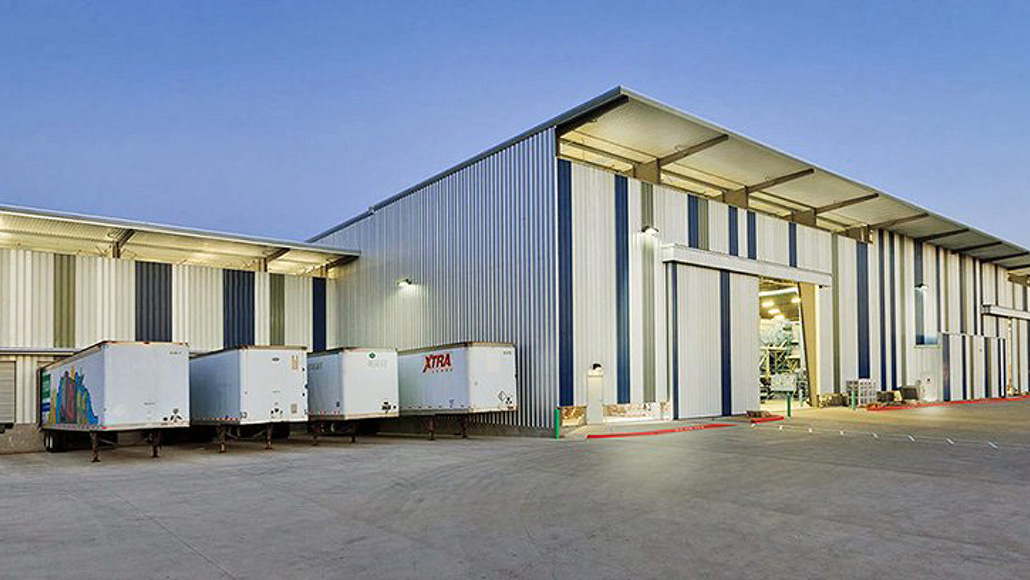
Closed Loop Partners and Balcones Resources will expand recycling and circular economy infrastructure and services across the United States, recapturing valuable materials and returning them to the manufacturing supply chain.
Contact: [email protected]
October 3 – Closed Loop Partners, a New York based investment firm focused on building the circular economy, announced today the acquisition of a stake in Balcones Resources through its private equity fund, the Closed Loop Leadership Fund.
Balcones Resources is a nationally recognized, best-in-class environmental services company that has been in business for 25 years, handling commercial and residential recycling, among other services, in Texas and Arkansas. Their commitment to operational excellence, advanced technology, and long-term partnerships makes Balcones an ideal platform to scale the circular economy within their current markets and across the United States.
Kerry Getter, Chairman and CEO of Balcones will continue to lead the company. Getter says,
“The expertise that Closed Loop Partners brings to the new relationship will provide unprecedented opportunities for corporate management and shareholder growth. Balcones and Closed Loop Partners’ cultures are similarly aligned. Together, we will be able to enhance employee opportunities, services to our customers, and assist in achieving a diverse set of ambitious environmental goals.”
The partnership builds on Closed Loop Partners’ extensive network of strategic stakeholders across the recycling and manufacturing value chain, from supplier relationships with corporate partners to recycling facilities to manufacturers across the United States. By better connecting and integrating the system, costs and volatility in the market are reduced.
“We’re investing across the supply chain with a long-term view of a more profitable and sustainable future. By scaling best-in-class businesses like Balcones, we will strengthen recycling and circular economy infrastructure in the U.S.”
Ron Gonen, CEO of Closed Loop Partners
The Closed Loop Leadership Fund brings together corporate investors, institutional investors, family offices, and foundations committed to building circular supply chains that reduce costs, increase margins, and protect the environment we share.
About Closed Loop Partners
Closed Loop Partners is an investment platform that invests in sustainable consumer goods, recycling and the development of the circular economy. Investors include many of the world’s largest consumer goods companies and family offices interested in investments that provide strong financial returns and tangible social impact. Learn more at www.closedlooppartners.com.
About Balcones Resources
Balcones Resources began operations in 1994 and has grown into a nationally recognized firm and one of the top 50 recyclers in North America. With more than 200 employees across its three locations, Balcones is a recycling partner for municipalities, multi-tenant facilities, corporate campuses, manufacturing facilities and distribution centers. For more information on Balcones Resources and its environmental services, visit BalconesResources.com.
Disclaimer:
This publication is for informational purposes only, and nothing contained herein constitutes an offer to sell or a solicitation of an offer to buy any interest in any investment vehicle managed by Closed Loop Capital Management or any company in which Closed Loop Capital Management or its affiliates have invested. An offer or solicitation will be made only through a final private placement memorandum, subscription agreement and other related documents with respect to a particular investment opportunity and will be subject to the terms and conditions contained in such documents, including the qualifications necessary to become an investor. Closed Loop Capital Management does not utilize its website to provide investment or other advice, and nothing contained herein constitutes a comprehensive or complete statement of the matters discussed or the law relating thereto. Information provided reflects Closed Loop Capital Management’s views as of a particular time and are subject to change without notice. You should obtain relevant and specific professional advice before making any investment decision. Certain information on this Website may contain forward-looking statements, which are subject to risks and uncertainties and speak only as of the date on which they are made. The words “believe”, “expect”, “anticipate”, “optimistic”, “intend”, “aim”, “will” or similar expressions are intended to identify forward-looking statements. Closed Loop Capital Management undertakes no obligation to update publicly or revise any forward-looking statements, whether as a result of new information, future developments or otherwise. Past performance is not indicative of future results; no representation is being made that any investment or transaction will or is likely to achieve profits or losses similar to those achieved in the past, or that significant losses will be avoided.
Six Companies Graduate from the NextGen Circular Business Accelerator Ready to Scale Their Sustainable Cup Solutions
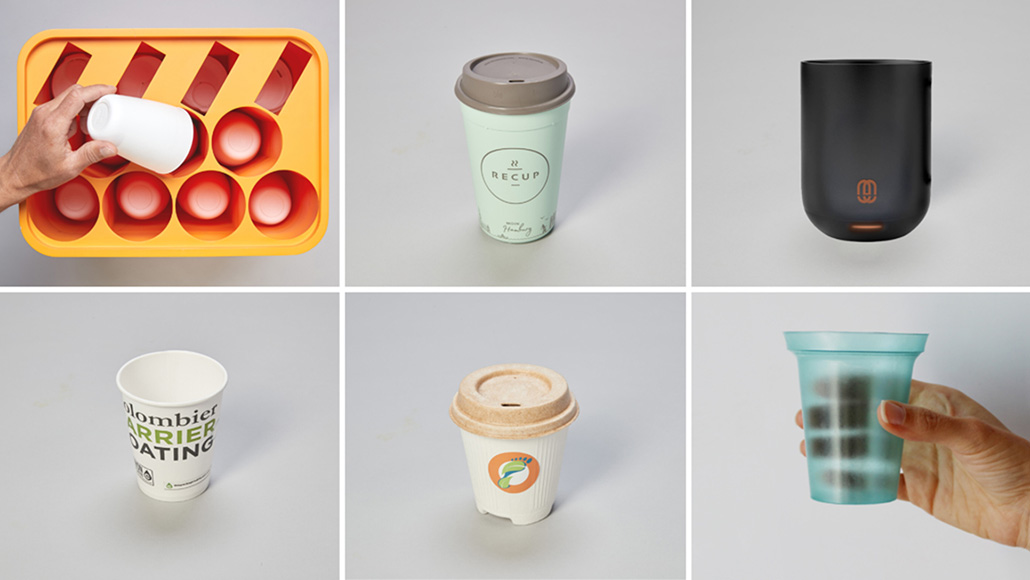
The NextGen Consortium, a pre-competitive collaboration managed by Closed Loop Partners in partnership with Starbucks and McDonald’s, accelerates towards a more circular cup system.
Contact: [email protected]
September 25 – NextGen Consortium Partners, investors, and other stakeholders convened during Climate Week in New York City for a Demo Day in which six participants in the NextGen Circular Business Accelerator showcased their manufacture-ready prototypes and pitch-ready business plans for growing their sustainable cup solutions.
The Accelerator follows Closed Loop Partners’ announcement of 12 NextGen Cup Challenge winners in February 2019. Six winning teams entered the NextGen Circular Business Accelerator, launched in partnership with global design firm IDEO to help companies further refine their cup solutions through rapid learning and iteration. The diverse solutions include cutting-edge plant-based materials, new innovative liners for cups, and reusable cup systems that redesign the fiber to-go cup so that it is more widely recoverable or remains in circulation for multiple uses. The six teams participating in the Accelerator are Colombier, CupClub, Footprint, Muuse, RECUP, and SoluBlue.
During the rigorous, six-month Accelerator program, companies accelerated their learnings through live in-context prototyping across four distinct Google campus locations, each housing multiple cafes. Progress for each cup solution was measured across four key categories: customer experience, server experience, performance, and disposal. Companies were able to see first-hand how customers and servers interact with their cups in a restaurant-like environment, capturing real-time feedback in a low-risk setting and identifying areas for refinement.
Companies also visited materials recovery facilities and explored the recovery side of the cup value chain, learning about the systems and infrastructure in place to ensure that their solutions are in alignment. Additionally, companies studied the value of materials recovered post-processing of their cups in order to make the economic case for more circular approaches.
Throughout the Accelerator, companies gained invaluable feedback through direct engagement with NextGen Consortium Partners, including founding partners Starbucks and McDonald’s, supporting partners The Coca-Cola Company, Yum! Brands, Nestlé, and Wendy’s, advisory partner WWF, and innovation partner IDEO. Feedback included insight into what it would take to roll out their solutions at a large scale.
“We are proud of the NextGen collaboration underway with so many companies championing greener cup technologies. We applaud Closed Loop Partners’ continued, on-track progress to determine what’s most viable, and we are excited for our own customers to try greener cups in our stores in the near future.”
John Kelly, senior vice president, Global Public Affairs & Social Impact at Starbucks
The companies were also welcomed behind the scenes of a McDonald’s restaurant to better understand how cups work within a store’s layout and staff operations.
“We were thrilled to have participants in the NextGen Circular Business Accelerator experience. Having these next gen solutions in our restaurants to see first-hand how our crew members manage through our restaurant operations is an important step. Compatibility with the fast pace of a QSR setting is critical, and it was great to see Accelerator teams jump at the opportunity to better understand these in-restaurant conditions. These cup solutions are helping shape the future of packaging, and we want to set them up for success while keeping valuable materials in circulation and, importantly, out of landfills and our oceans.”
Marion Gross, Senior Vice President and Chief Supply Chain Officer, McDonald’s USA
“Seeing how far participants in the NextGen Circular Business Accelerator have come is truly rewarding. The NextGen Consortium will continue to work with winning teams to ensure that when their solutions do enter market at scale they’re set up for success and recoverability.“
Kate Daly, Managing Director of the Center for the Circular Economy at Closed Loop Partners
The other six winners of the NextGen Cup Challenge, which are later-stage in their development, are working with the NextGen Consortium to identify in-market piloting opportunities in regions across the globe. Some participants in the NextGen Circular Business Accelerator are also expected to announce in-store pilots as early as 2020.
The Cup Challenge and the NextGen Circular Business Accelerator are just one part of the NextGen Consortium’s efforts to address single-use food packaging waste globally by advancing the design, commercialization, and recovery of food packaging alternatives. The Consortium is also focused on infrastructure and consumer engagement, supported by stakeholder collaboration across the value chain.
“Watching the aggregation of innovative ideas turn into real progress has been exciting to watch. Now we’ll look to the members of the NextGen Consortium to take these solutions into the marketplace and watch real change happen.”
Erin Simon, Director, Sustainability R&D, World Wildlife Fund
About NextGen
Each year, an estimated 250 billion fiber to-go cups are distributed worldwide. Most of these are not recyclable or compostable. The NextGen Consortium and Cup Challenge launched in 2018 to bring together entrepreneurs, industry, and recyclers to identify and commercialize the next generation of recyclable and/or compostable cups. Closed Loop Partners, Starbucks, McDonald’s, The Coca-Cola Company, Yum! Brands, Nestlé and Wendy’s invite the industry to join this effort to identify a global solution to this shared challenge.
About Closed Loop Partners
Closed Loop Partners is an investment firm that invests in sustainable consumer goods, recycling, and the development of the circular economy. Investors include many of the world’s largest consumer goods companies and family offices interested in investments that provide strong financial returns and tangible social impact. In 2018, Closed Loop Partners launched the Center for the Circular Economy, a New York City-based collaboration center for innovators to commercialize products, services, and technologies that are leading the transition from a linear take, make, waste economy to a restorative one in which materials are shared, re-used, and continuously cycled. Learn more at www.closedlooppartners.com.
About McDonald’s
McDonald’s is the world’s leading global foodservice retailer with over 37,000 locations in over 100 countries. Over 90 percent of McDonald’s restaurants worldwide are owned and operated by independent local business men and women. This year McDonald’s announced a series of commitments demonstrating how it will use its Scale for Good to positively impact the planet and the communities it serves. You can read more about McDonald’s Scale for Good initiatives here.
About Starbucks
Since 1971, Starbucks Coffee Company has been committed to ethically sourcing and roasting high-quality arabica coffee. Today, with stores around the globe, the company is the premier roaster and retailer of specialty coffee in the world. Through our unwavering commitment to excellence and our guiding principles, we bring the unique Starbucks Experience to life for every customer through every cup. To share in the experience, please visit us in our stores or online at http://news.starbucks.com or www.starbucks.com.
NextGen Consortium Partners
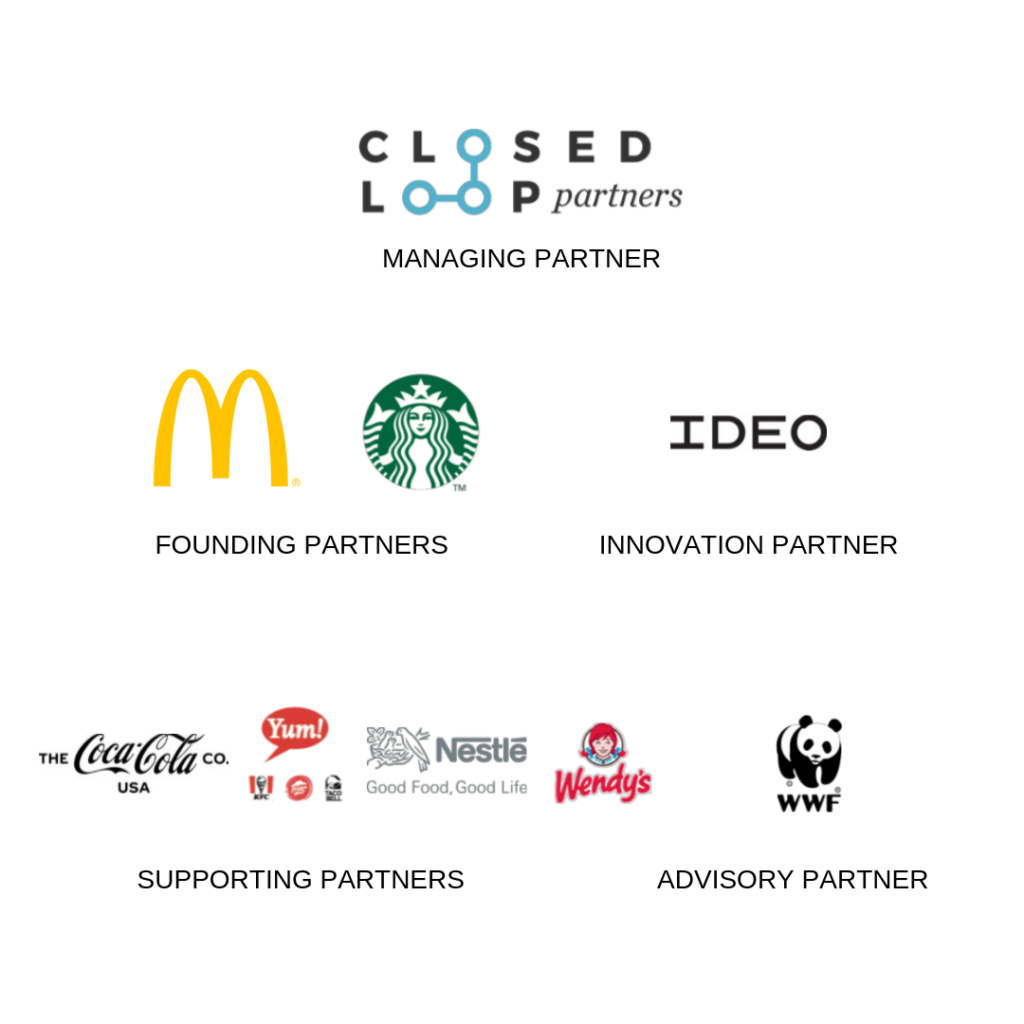
Sustainable Packaging Coalition and Center for the Circular Economy at Closed Loop Partners Announce Winner of the FlexPack Recovery Challenge
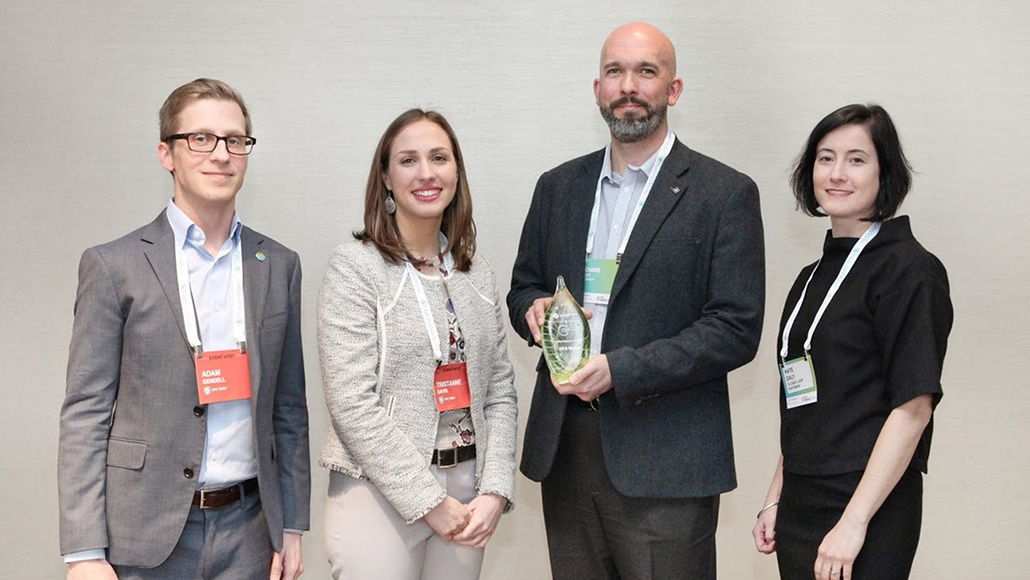
Start-ups from across the globe showcased their recovery technologies for a fast-growing category of hard-to-recycle flexible plastic packaging, and one winner was selected to join a mentorship program with the Sustainable Packaging Coalition & Closed Loop Partners.
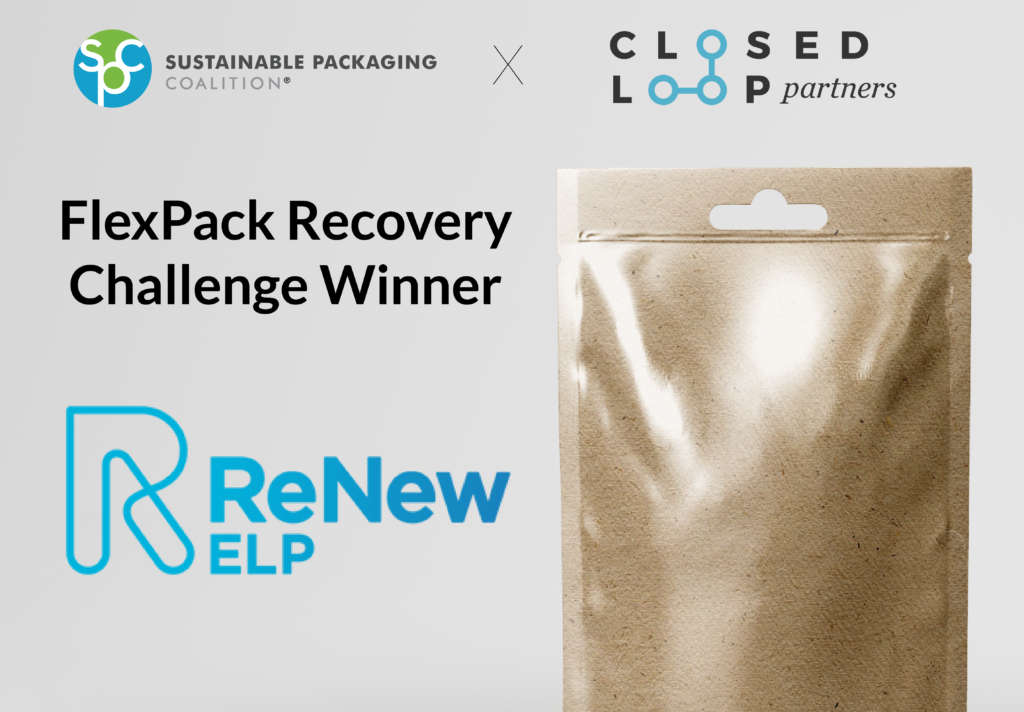
CHARLOTTESVILLE, VA and NEW YORK, NY — the Center for the Circular Economy at Closed Loop Partners and the Sustainable Packaging Coalition (SPC) have announced the winner of the FlexPack Recovery Challenge: ReNew ELP.
In October 2018, the SPC and the Center for the Circular Economy at Closed Loop Partners launched the FlexPack Recovery Challenge, an open competition for innovators, entrepreneurs, and start-ups to submit new ideas for reprocessing technologies capable of beneficially recovering multi-material flexible packaging waste.
Five finalists were selected by a panel of judges from the SPC and the Center for the Circular Economy at Closed Loop Partners staff, as well as with input from industry advisors. Each finalist participated in the SPC’s spring conference SPC Impact and presented to an audience of major brands, plastic manufacturers, and packaging suppliers, including members of the SPC’s Industry Leadership Committee on Multi-Material Flexible Recovery, on how their technologies can beneficially recover the embodied environmental investment within multi-material flexible packaging waste and can be scaled to provide meaningful solutions. These finalists included Cadel De-Inking, ReNewELP, Renewlogy, Synova-BioBTX, and Ekopolimer. Read more about all of our finalists.
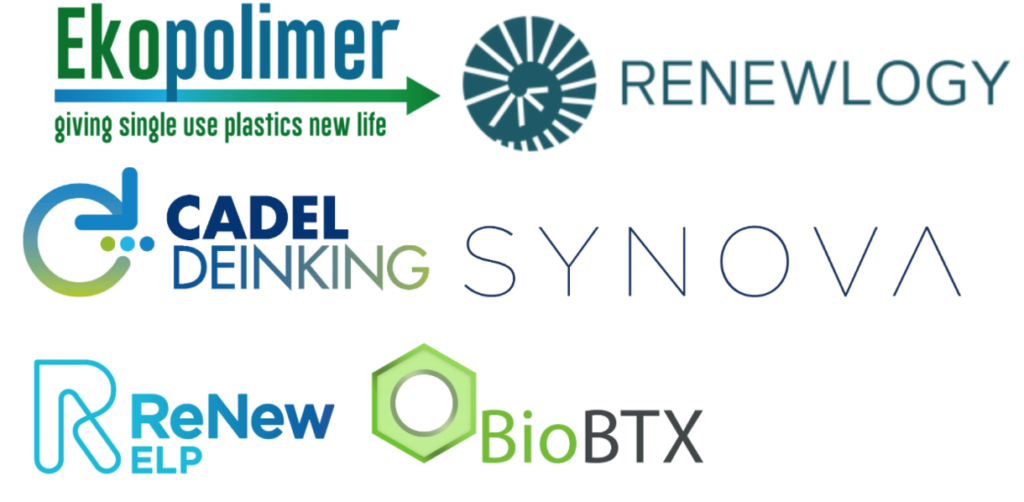
Among the five finalists, ReNewELP was selected as the final Challenge winner. RenewELP will receive a free year of membership to the SPC and enter into a mentorship program jointly run by the SPC and Closed Loop Partners.
“RenewELP submitted a detailed, transparent process description and market analysis. We were impressed with the processing capacity scale (up to 80,000 -100,000 tons per year in their initial facility) and the fact that their unique CAT-HTR technology allows for mixed waste feedstocks, including paper, PET and organics. Their modular approach considers variable material costs in different markets and their end markets for diverse hydrocarbon products like oils, waxes, and chemicals represent large market potential. RenewELP is a great fit to participate in a mentorship program run by our organizations,”
said representatives from the SPC and Closed Loop Partners in a joint statement.
The SPC & The Center for the Circular Economy at Closed Loop Partners team followed up with Richard Daley, Managing Director of RenewELP, for a post challenge interview.
Read the Q&A with Richard here
The SPC and CLP believe that all of technologies presented by the Finalists represent the kinds of diverse solutions needed for recovery of flexible packaging. We look forward to staying in touch with all the finalists and tracking and promoting their progress.
Learn more about the FlexPack Recovery Challenge.
ABOUT THE CENTER FOR THE CIRCULAR ECONOMY AT CLOSED LOOP PARTNERS
The Center for the Circular Economy brings together industry experts, academic researchers, and entrepreneurs who are solving for today’s most pressing challenges in design and reuse, providing a collaboration center for innovators to commercialize products, services and technologies that are leading the transition from a linear take, make, waste economy to a restorative one in which materials are shared, re-used, and continuously cycled.
ABOUT THE SUSTAINABLE PACKAGING COALITION
The Sustainable Packaging Coalition is a membership-based collaborative led by an independent non-profit that believes in the power of industry to make packaging more sustainable. Using an objective life-cycle-based approach, we work in a constructive atmosphere to provide thought leadership and bring our members together to strengthen and advocate the business case for more sustainable packaging.
Closed Loop Partners Announces 12 Winners of the NextGen Cup Challenge to Reimagine the Future of the Fiber To-Go Cup
February 27, 2019
Starbucks, McDonald’s and other industry leaders partner in pre-competitive collaboration to push the boundaries of sustainable design and find innovative cup solutions
NEW YORK, Feb. 27, 2019 /PRNewswire/ — The NextGen Consortium, convened by Closed Loop Partners, announced today the winners of the NextGen Cup Challenge – an open-sourced, global innovation challenge to redesign the fiber to-go cup and create a widely recyclable and/or compostable cup.
After a rigorous four-month review process by an esteemed group of judges including NextGen Consortium business leaders, as well as experts in recycling, composting and packaging, the Challenge narrowed the nearly 500 submissions from over 50 countries down to 12 winners.
These 12 winning solutions — broadly categorized into innovative cup liners, new materials, and reusable cup service models — have the potential to turn the 250 billion fiber to-go cups used annually from waste into a valuable material in the recycling system.
“This is a notable milestone to achieve our aspiration of sustainable coffee, served sustainably which is a particular passion for our over 350,000 Starbucks partners,” said John Kelly, Senior Vice President of Global Public Affairs and Social Impact at Starbucks. “We’re a founding partner of the NextGen Consortium because we believe it will take the scale and influence of many global companies to make recyclable, compostable to-go cups an industry standard rather than the exception.”
Many of the largest players in the food and beverage industry have united within the NextGen Consortium, making it a unique pre-competitive collaboration. Starbucks and McDonald’s were early investors and founding partners of the NextGen Consortium, with The Coca-Cola Company, Yum! Brands, Nestlé and Wendy’s joining as supporting partners. The World Wildlife Fund acts as an advisory member of the Consortium, and OpenIDEO is an innovation partner. Collectively representing a significant portion of the cups market, these brands are not only demonstrating their commitment to ending cup waste and driving innovation in packaging, but also accelerating the paths to global scale.
“McDonald’s is proud to work with such an unprecedented number of brands to address the issue of fiber to-go cups,” said Marion Gross, Senior Vice President and Chief Supply Chain Officer, McDonald’s USA. “Collaboration is what we need to truly move the needle, amplify impact and bring solutions to scale quickly.”
The NextGen Challenge winner solutions are advancing the transition to a more circular economy where materials are continuously cycled and reliance on raw materials is reduced. “By working across the entire value chain and engaging key stakeholders, winners of the NextGen Cup Challenge are tackling a complex problem in a holistic way, sending valuable material back into the supply chain – benefiting people, the planet, and businesses,” said Erin Simon, Director, Sustainability R&D, World Wildlife Fund.
Up to six winners will enter the NextGen Circular Business Accelerator, where they’ll gain access to a network of experts, business and technical resources and testing opportunities to ensure these innovations can successfully scale to serve the needs of the industry and maintain the performance standards we know and trust.
The Challenge is just the first stage of the NextGen Consortium’s three-year effort. Next, the NextGen Circular Business Accelerator, with testing and piloting opportunities, will help solutions get onto the shelf. Further, the Consortium is working with suppliers, recyclers and composters to ensure that the winning solutions can get successfully recovered for the highest value. The Consortium will work together to support the needs of the recycling and composting system and identify ways to make it easy for consumers to choose the right bin.
“The level of interest we saw in the Challenge demonstrates a real appetite for long-lasting sustainable packaging solutions,” said Kate Daly, Executive Director of the Center for the Circular Economy at Closed Loop Partners. “This level of industry collaboration in support of the NextGen Cup Challenge is really exciting, and we look forward to building on this momentum to encourage more innovative solutions. Fully recoverable fiber to-go cups are just the beginning.”
For more information on the winners, the Challenge and the NextGen Consortium, visit www.nextgenconsortium.com.
The 12 Winners of the Challenge
Category One: Innovative Cup Liners
These companies are rethinking the polyethylene plastic liners in cups that can currently make to-go cups difficult to recycle.
- C.E.E.R. SCHISLER, France, creates a 100% paper cup that is home compostable and recyclable.
- Colombier Group, Netherlands, Finland, creates a recyclable and compostable barrier for paperboard cups.
- Footprint US, USA, creates cups, lids and straws that are fully formed fiber-based solutions, with an aqueous-based coating that is recyclable and compostable.
- Kotkamills Oy, Finland, creates plastic-free, recyclable and compostable cupstock material that can be processed into cups at existing cup making machines.
- PTT MCC Biochem Company Limited, Thailand, creates a coated paper cup that is recyclable and home compostable.
- Solenis LLC, USA, Belgium, creates a barrier coating that is recyclable and compostable.
- Sun Chemical Corporation, USA, creates inks and coatings that are recyclable and compostable.
- WestRock Corporation, USA, creates a recyclable and compostable paperboard solution to cups.
Category Two: New Materials
These companies are using cutting edge, plant-based materials in their cups so that they are compostable.
- Solublue Ltd., UK, creates plant-based, food grade and non-toxic products that biodegrade after use.
Category Three: Reusable Cup Service Models
The cups made by these companies aren’t single-use, they just keep cycling – remaining in service by harnessing the power of technology and design.
- CupClub, UK, operates a returnable cup ecosystem, providing a service for drinks. Think bike sharing, but for cups.
- reCup GmbH, Germany, operates a deposit system for reusable cups. Rent their cup and return it to any participating partner shop. No cleaning of the cup or carrying around required.
- Revolv, Indonesia, Hong Kong (China), operates a deposit-based platform for smart, reusable beverage packaging, connecting their cups–and third party products–to Internet of Things technologies.
About NextGen
Each year, an estimated 250 billion fiber to-go cups are distributed worldwide. Most of these are not recyclable or compostable. The NextGen Cup Consortium and Challenge launched in 2018 to bring together entrepreneurs, industry, and recyclers to identify and commercialize the next generation of recyclable and/or compostable cups. Closed Loop Partners, Starbucks, McDonald’s, The Coca-Cola Company, Yum! Brands, Nestlé and Wendy’s invite the industry to join this effort to identify a global solution to this shared challenge.
About Closed Loop Partners
Closed Loop Partners is an investment platform that invests in sustainable consumer goods, recycling and the development of the circular economy. Investors include many of the world’s largest consumer goods companies and family offices interested in investments that provide strong financial returns and tangible social impact. In 2018, Closed Loop Partners launched the Center for the Circular Economy, a New York City-based collaboration center for innovators to commercialize products, services and technologies that are leading the transition from a linear take, make, waste economy to a restorative one in which materials are shared, re-used, and continuously cycled. Learn more at www.closedlooppartners.com.
About McDonald’s
McDonald’s is the world’s leading global foodservice retailer with over 37,000 locations in over 100 countries. Over 90 percent of McDonald’s restaurants worldwide are owned and operated by independent local business men and women. This year McDonald’s announced a series of commitments demonstrating how it will use its Scale for Good to positively impact the planet and the communities it serves. You can read more about McDonald’s Scale for Good initiatives here.
About Starbucks
Since 1971, Starbucks Coffee Company has been committed to ethically sourcing and roasting high-quality arabica coffee. Today, with stores around the globe, the company is the premier roaster and retailer of specialty coffee in the world. Through our unwavering commitment to excellence and our guiding principles, we bring the unique Starbucks Experience to life for every customer through every cup. To share in the experience, please visit us in our stores or online at http://news.starbucks.com or www.starbucks.com.
Additional Quotes
“Solving the issue of plastic waste requires collaboration among many different stakeholders,” said Stefan Palzer, Nestlé Chief Technology Officer. “We are excited to join the NextGen Consortium and Cup Challenge as it brings together start-ups, industry partners and suppliers to find an industry wide, global packaging solution for sustainable to-go cups.”
“Yum! Brands would like to congratulate all of the Challenge winners for bringing forward incredible innovation that will help find food packaging solutions for our industry and beyond,” said Jon Hixson, VP Global Government Affairs and Sustainability, Yum! Brands. “The NextGen Consortium provides an amazing platform for collaboration and we look forward to seeing the continued progress that comes from the partnership to drive positive change in the value chain.”
“At Wendy’s, we know that our customers are increasingly aware of packaging waste and its impact on the environment,” said Liliana Esposito, Wendy’s Chief Communications Officer. “We embrace our role as being part of the solution, and one way we do that is to engage in partnerships that help us arrive at smart solutions, like our partnership with the NextGen Consortium. We congratulate the winners in this phase of the NextGen Cup Challenge, and look forward to seeing their ideas come to life and make a difference.”
“It’s encouraging to see such a diverse range of innovative solutions that represent milestones in the journey toward more comprehensive recyclability and compostability of cups across the board,” said Nina Goodrich, Executive Director, GreenBlue and the Sustainable Packaging Coalition. (Nina Goodrich is a judge for the NextGen Cup Challenge)
“It’s great to see the momentum behind the NextGen Cup Challenge coming from a number of large brands,” said Abe Minkara, Managing Director, Mark Cuban Companies. “Together with the innovative winning ideas, the combination is truly powerful. Scaling a sustainable solution to the to-go cup ecosystem becomes not only attainable but inevitable.” (Abe Minkara is a judge for the NextGen Cup Challenge)
“The winners of the NextGen Cup Challenge represent an inventive spectrum of creative chemistry, design and manufacturing technology demonstrating real progress toward the recyclability and compostability of post-consumer cups and containers,” said Scott Seydel, Board Chair and CEO, The Seydel Companies and Board Trustee of the Ellen MacArthur Foundation US. (Scott Seydel is a judge for the NextGen Cup Challenge)
Contact: [email protected]
SOURCE Closed Loop Partners
